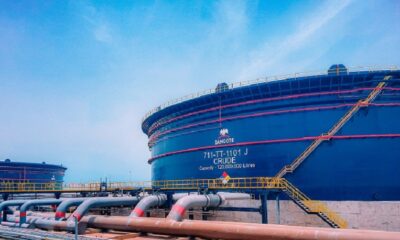Energy
Dangote Backs Tinubu’s CNG Initiative With Over $280m Investment

. . . Becomes The Largest Operator Of CNG Trucks In Nigeria
In a bold demonstration of support for President Bola Ahmed Tinubu’s CNG Initiative, which aims to provide cheaper and cleaner fuelling alternatives for all Nigerians, Dangote Cement Plc has made significant investments exceeding $280 million in Compressed Natural Gas (CNG) technology and infrastructure.
Recall that President Tinubu, whose commitment to CNG deployment and clean energy is unmatched in Africa, has maintained his administration’s drive to create a conducive environment for private sector investments and expand Nigeria’s CNG infrastructure to enhance energy efficiency and drive economic growth.
As part of this initiative, President Tinubu ordered the distribution of one million free CNG conversion kits for commercial vehicles involved in transporting people, food, and goods.
ALSO READ: FG To Launch 100 New CNG Stations Nationwide Within Six Months
At a recent event, President Tinubu emphasised the urgent need for Nigeria to utilise its vast natural gas resources in the transportation sector.
He stated that CNG transportation is an economic necessity for Nigeria, signalling a significant shift in the country’s approach to public transportation and energy use.
President Tinubu said, “Utilising natural gas to power Nigeria’s transportation industry is the next way to go.”
On its part, the Dangote Cement said the over $280m investment not only solidifies its leadership in the CNG sector but also reflects its dedication to mitigating climate change and supporting a transition to a low-carbon economy.
The Group Managing Director of Dangote Cement Plc, Arvind Pathak, asserted that the investment aims to acquire 100% CNG trucks as part of a long-term plan to transition its entire fleet to CNG.
This move marks a significant milestone in Dangote’s clean energy transition, with the objective of operating most of its fleet on CNG by mid-2026. As at October, the company has received its first batch of 1,500 mono-fuel CNG trucks while expecting additional 1,600 CNG trucks; which would bring the total to 3,100 before the end of the year.
Pathak stated, “By mid- 2026, Dangote Cement aims to operate a fleet predominantly powered by CNG. To facilitate this transformation, we are investing in expanding our CNG fuelling infrastructure, ensuring that our growing fleet has reliable access to CNG as our fuel.”
He added that plans were afoot to aggressively pursue this timeline of deployment, beginning from the first quarter of 2025. “We are keeping our eyes on the ball to ensure that we do not miss our target dates of full compliance.”
Pathak said that the company’s CNG infrastructure investments have positively influenced Nigeria’s transition to cleaner fuels.
He pointed out that the CNG station at Obajana, capable of refuelling over 3,000 trucks, exemplifies this commitment, with a second station currently under development in Ibese to further support fleet operations.
President/Chief Executive, Dangote Group, Aliko Dangote said the company’s investments in CNG are also in line with Nigeria’s Nationally Determined Contribution (NDC) under the Paris Agreement, which aims for net-zero emissions by 2060.
“In this pursuit of transition to clean energy, we are optimistic of a remarkable accomplishment by President Bola Ahmed Tinubu, as he has taken the lead in the nation’s drive towards energy efficiency. This presupposes private sector intervention to support this noble idea initiated by the President,” Dangote added.
He noted that the company’s early adoption of CNG has made it the largest operator of CNG trucks in Nigeria, emphasising that the initiative is a boost to President Tinubu’s quest towards enhancing the nation’s energy independence and contributing to a more secure energy future.
According to him: “We are now using CNG vehicles, especially with the new policy of the Federal Government, launched under the Renewed Hope Agenda by His Excellency, President Bola Ahmed Tinubu. We are committed to a cleaner and greener future.”
Energy
SNEPCo, Former MD Aiboni Win Energy Times’ Awards

The Shell Nigeria Exploration and Production Company (SNEPCo) has been named Major Oil Company of the Year for last year by a Nigerian publication, Energy Times.
Biztellers reports that this is in recognition of the company’s contributions to deep-water oil and gas development and the industry generally.
Energy Times also awarded the title of Amazon of Nigeria’s Oil Sector for 2024 to Elohor Aiboni, a former Managing Director of SNEPCo now on international assignment in Brunei.
The awards were presented to SNEPCo’s Senior Operations Manager, Bolanle Odunayo-Ojo, who represented the Managing Director, Ronald Adams at a ceremony attended by key stakeholders in the oil and gas sector.
ALSO READ: BREAKING: Again, Dangote Cuts Petrol Price To N835 per Litre
“We are honored to receive the recognitions for the company and our former Managing Director as they underscore our dedication to excellence in the upstream sector,” Bolanle stated. “The modest achievements are result from teamwork and support by our partners, particularly the Nigerian National Petroleum Company Limited and regulatory agencies. The awards encourage us to continue to work together to power progress and innovation in Nigeria’s energy landscape.”
The SNEPCo has been a pioneer in Nigeria’s deep-water oil and gas production since it began production from Bonga in 2005, Nigeria’s first deep-water well. Gas from Bonga is also piped to Nigeria Liquefied Natural Gas Company Limited at Bonny Island. SNEPCo’s operations have led to significant discoveries, including Bonga Southwest in 2001 and Bonga Northwest, which began production on August 5, 2014.
In its award, the Board of Directors of Energy Times pointed to the continuing success of Bonga, notably production of the 1 billionth barrel of oil in February 2023 and the recent Final Investment Decision on the $5 billion Bonga North project.
The award on Aiboni’s highlights a career that has seen her serve in various business and leadership roles within and outside Nigeria. She was appointed Managing Director of SNEPCo in 2021 and led initiatives that deepened operational efficiency, local content development and social investment projects across the six geopolitical zones in the country.
Energy
Shell Commends Oloibiri Lecture Series As Platform For Change

Shell Nigeria Exploration and Production Company Ltd (SNEPCo,) one of the sponsors of the Oloibiri Lecture Series and Energy Forum (OLEF) has commended it as a platform for driving change in Nigeria’s energy sector through the discussions that centre on business performance, cost discipline and process simplification.
“This event is special to the Shell brand, not only because of the nostalgia of Oloibiri but the quality of discourse it has enabled in our sector over the years,” SNEPCO Managing Director Ronald Adams said in a goodwill speech delivered by General Manager, Wells and Geosciences Operations Joe Mordi. He said: “We are grateful to the Society of Petroleum Engineers and our host the Petroleum Technology Development Fund (PTDF) for another successful outing.”
Organised by the Society of Petroleum Engineers (SPE) Nigeria Council, the Oloibiri Lecture Series and Energy Forum began in 1991, in commemoration of the country’s first commercial oil discovery by Shell at Oloibiri, Bayelsa State, in 1956. Ronald said recent developments in the Upstream and Downstream sectors of the energy industry, including the $5-billion final investment decision by Shell in the Bonga North Deepwater project echoed the sentiments around the first oil discovery.
ALSO READ: No Safety Guarantee For Unscheduled Visitors To Benue – Gov Alia
He noted that, “These strides come with a commitment to excellence required of us – for stakeholders, colleagues, our country and indeed, future generations. The theme for this year ‘Driving energy sustainability through technology, policy and supply chain excellence’ reflects this commitment. The future is bright, and we have the opportunity to co-create it.”
Energy
NLNG Improves Nigeria’s Domestic LPG Supply Efficiency

In line with its continuous improvement culture, the Nigeria LNG Limited (NLNG) will be working closely with its stakeholders to improve operational efficiency in its domestic Liquefied Petroleum Gas (DLPG) supply in Nigeria.
According to a statement from its General Manager, External Relations and Sustainable Development, Sophia Horsfall, this was highlighted at an engagement session with stakeholders in Lagos.
It was gathered that the NLNG plans to enhance engagement and improve operational efficiency of its LPG supply through digitalisation of some of its processes which include a new platform designed to streamline regulatory processes, optimise risk management, and enhance the buyer experience. The platform will feature IT-supported relationship management, automated issue resolution, centralised real-time payments, and improved case management systems, ensuring a seamless supply process despite market shifts and external pressures.
ALSO READ: Ifon-Ilobu Crisis: Adeleke Assures Of Quick Restoration Of Peace
Manager, Commercial Contract Management, NLNG, Tolulope Longe, reiterated that the planned improvements will enable and consolidate NLNG’s resolve to delivering 100% of its LPG supply to the Nigerian market.
She said a strategic roadmap was in play to ensure the achievement of NLNG’s longstanding goals of LPG being accessible and available in the country, aligning with its vision of being a globally competitive energy company, improving lives sustainably. She also harped on the significance of these improvement initiatives and the Company’s push for LPG utilisation as a clean energy source alternative to kerosene and other fossil fuels
Longe noted that the Company remained focused on growth and sustainability of the LPG market by continuously enhancing its supply processes in collaboration with offtakers. She stressed NLNG’s commitment to collaborating with stakeholders to maintain pricing stability and long-term market viability. While acknowledging industry concerns, she noted the importance of operational efficiency in meeting market demands.
NLNG aims to strengthen stakeholder engagement and improve market efficiency in the LPG sector through enhanced customer interactions, minimised schedule disruptions, timely confirmations and deliveries, and prioritisation of customers with demonstrable capacity. As it adapts to market realities, NLNG remains committed to driving sustainability and delivering lasting value to Nigerians.



















